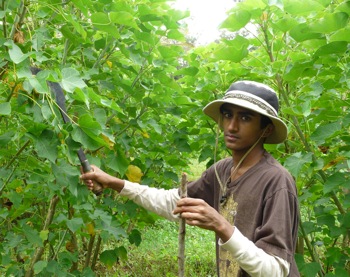For the past three years, Adarsha Shivakumar has worked nights and weekends to run a non-profit dedicated to helping impoverished Indian farmers produce biofuels. He has formed an alliance with an NGO and a biotech company to ensure that growers get a good price for their product. And he has used personal funds to purchase seedlings for villagers willing to try a sustainable crop.
Not a bad resume for a 16-year-old.

This week the Pleasant Hill native received the prestigious Brower Youth Award for “environmental leadership,” at a ceremony in San Francisco. He is being honored for mixing economics and environmentalism, in his efforts to aid tobacco farmers in India’s Karnataka region.
Shivakumar, who acts as though founding a non-profit is something most high school juniors do in their spare time, grew up visiting the region annually with his family. While there, he was taken aback by the hard life of the local tobacco farmers. His Indian relatives told him that the workers were at the mercy of the crop’s unstable price.
By the time he was twelve he had another realization: the farmers’ over-reliance on tobacco was leading to the slow-motion demolition of a nearby national forest.
“When we went there each year, what we noticed was that more and more sections of forest were just disappearing on the outskirts,” the Oakland College Preparatory High School student said. “This was due to tobacco growing, because what happens is the farmers have to cure the tobacco that they grow, and that requires firewood–a lot of firewood: two kilograms plus of firewood for one kilogram of tobacco.”
“It’s having a huge impact on the wildlife there. Each year…the forest is just steadily being destroyed,” he said.
So the American pre-teen decided to do something. Biofuels were big news in the United States at the time, but corn-based ethanol was getting a bad rap for causing food shortages. So he hunted around for a crop that could produce biofuel, but didn’t double as dinner for families in the developing world. Eventually he settled on Jotrapha curcas, a semi-poisonous plant that is hearty enough to survive the occasional drought and produces seeds that contain about 35% oil.
By encouraging villagers to plant Jotrapha, as well as the tobacco they traditionally grow, Shivakumar would aim to increase the farmers’ income and protect the ecologically sensitive forests nearby (Shivakumar took mild offense at a recent report on NPR about the harsh realities of Jatropha growing in Kenya. He says it’s important not to rely solely on Jatropha as a cash crop, and has learned from his time in Karnataka that, like any plant, Jatropha must be watered and cared for.)
At 13 he teamed up with his younger sister, Apoorva Rangan, and the two of them scrounged together what money they had to buy seedlings and get “Project Jatropha” off the ground. “When I was in the seventh grade I’d won the California State Spelling Bee and I got around $600 from that as a cash prize and I used that money to jumpstart the project,” Shivakumar said. “Apoorva and I had some funds that we had from baby sitting and all, and we used that as well,” he added.
The two worked with the farmers for weeks, trying to gain their trust and convince them to mix a little Jatropha in with their tobacco. In a culture where respect comes with age, Shivakumar said, this was no easy task.
But with the help of a local NGO called Parivarthana (Sanskrit for “change”) and the biotech company Labland Biotechs, he secured a deal that he hoped would make Jatropha planting profitable. Parivarthana would help teach the farmers sustainable agriculture, and Labland–which converts Jatropha into biofuel–would pay the growers for every kilogram of the crop they produced.
Shivakumar said that two years on, Project Jatropha is expanding and going strong. He still devotes hours of his days to communicating with workers in India, but said that lately much of his time has been swallowed up by media requests. He takes on these interviews, he said, to remind others that they can make a difference.
“We have to take action now–that’s the main thing,” he said. “And I hope Project Jatropha will show that it’s possible to take action and affect people in greater ways, and we hope to motivate and inspire others to take action as well.”
The Brower Youth award comes with a $3,000 prize, and it’s not hard to guess how Shivakumar will spend his winnings. “When I found out that we won, I was shocked yet very happy to say the least, because the $3000 cash prize we got is being reinvested into the project,” he said.
California is also home to two other Brower Youth Award winners. Ventura resident Alec Loorz, the youngest recipient this year, won for spreading the word about climate change. Inspired by Al Gore’s “An Inconvenient Truth,” the 15 year old has given at least 75 presentations on global warming to more than 10,000 people.
In his spare time, Loorz founded an organization dedicated to educating young people about climate change (Kids vs. Global Warming, penned a Declaration of Independence from Fossil Fuels, and is set to launch the California Climate Council of Youth, or C3Y, an effort to bring precocious kids together to brainstorm and learn how to combat global warming.
Hai Vo, a 22 year old University of California, Irvine graduate, was honored for a project to bring more sustainable food to his college campus. He worked to bring “real” food, i.e. “ethically produced, with fair treatment of workers, equitable relationships with farmers (locally and abroad), and humanely treated animals” to Irvine, and eventually convinced the entire UC system to offer 20% sustainable food at its campus dining facilities by 2020.
This post was reported and written by Climate Watch intern David Ferry.
